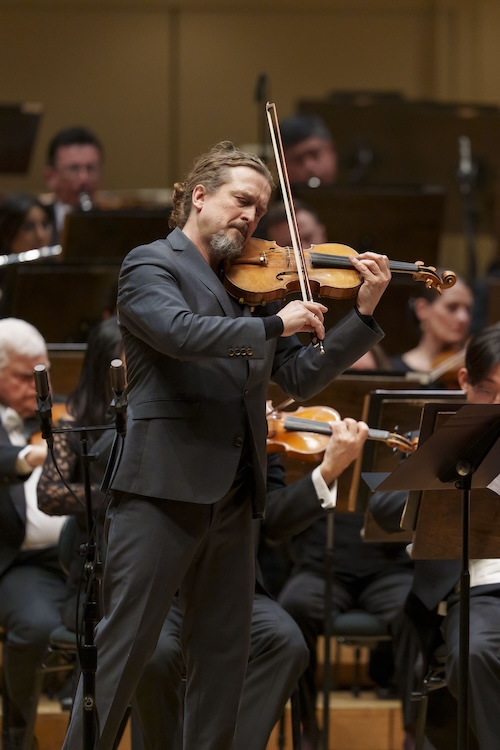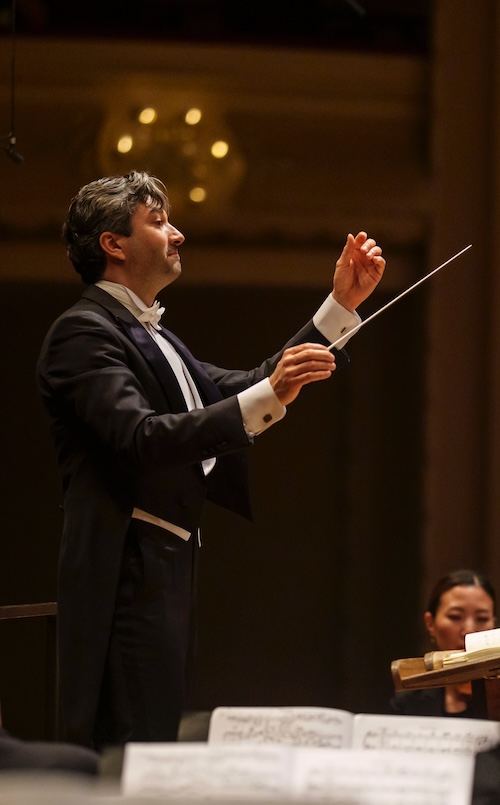Tetzlaff’s Sibelius provides the highlight in CSO’s loud, uneven outing with Afkham

Serendipity abounded at Orchestra Hall Friday night. A Northern concerto reflected the evening’s icy blasts and intermittent blizzard while a tragic love story provided timely counter-programming for Valentine’s Day skeptics.
Unfortunately, the musical rewards proved decidedly uneven with David Afkham on the podium. The German conductor’s appearances leading the Chicago Symphony Orchestra have been mixed at best in previous outings, and Friday night’s concert was less than that. Coming off two stellar weeks with Esa-Pekka Salonen at the CSO helm, it felt foreign to have such a maladroit figure leading this orchestra.
The evening began with the Prelude to Act III from Wagner’s Lohengrin. For all the familiarity of this work, Friday’s concert—amazingly—marked its first performance on a CSO subscription event in 38 years. That neglect is likely due to the fact that this brilliant curtain-raiser is a challenge to program, requiring a large orchestra for just three-and-a-half minutes of music.
The performance began in stirring fashion yet soon reverted to form with Afkham pumping up the brass to assaultive levels. This conductor is one of those for whom there is simply no such thing as too loud—no matter what dynamic is indicated in the score.
Mercifully, the focus then shifted to Christian Tetzlaff as solo protagonist in Sibelius’s Violin Concerto.
For those who believe solo performances should be polished to perfection with full note values, Tetzlaff is not the violinist for you. While his technique is admirable, the German violinist’s bristling, edgy style tends to throw caution to the wind in concert—and sometimes intonation and accuracy along with it. That can make things exciting and sometimes scary, as with the errant bow stroke in the opening minutes of Friday’s Sibelius performance.
But on this occasion the mercurial soloist’s nervy intensity and sinewy tone proved largely well suited to Sibelius’s darkly brooding music. Playing from a score, Tetzlaff conveyed the surging drama of the opening movement, if a bit too emphatically at times. That was balanced by his plaintive tone and the searching expression he drew from the second theme, and the burst of fireworks at the end of the movement was undeniably thrilling.
The soloist was at his most communicative in the Adagio, Tetzlaff bringing great lyrical warmth to this expressive music and drawing out the lingering final phrases in a hushed and confiding fashion.
The galumphing finale was more menacing than quirkily genial with what Sibelius termed a “danse macabre” quality very much to the fore. Tetzlaff ratcheted up the excitement with the increasing brilliance of the solo writing, culminating in an exhilarating payoff at the coda.
Afkham’s accomplishment was typically hit and miss—fitfully out of synch with the soloist and veering between pedestrian and literal with blaring, blowsy tuttis.
The repeated curtain calls brought Tetzlaff back out for an encore. One of our finest Bach violinists, Teztlaff offered a lovely, interior rendering of the Sarabande from the Partita for Solo Violin No. 2 in D Minor, BWV 1004.

in music of Wagner, Sibelius and Schoenberg Friday night. Photo: Todd Rosenberg
Music of Arnold Schoenberg is infrequently encountered at Orchestra Hall these days, so one was glad for the opportunity to hear the composer’s Pelleas and Melisande in its first CSO outing in nearly two decades.
Inspired, like Claude Debussy’s contemporaneous opera, from Maurice Maeterlinck’s popular symbolist play of the tragic title lovers, Schoenberg’s Pelleas and Melisande is a vast tone poem, scored for huge forces and cast in a single 45-minute movement. Structurally, Pelleas is a quasi-symphony in four unbroken sections; there are echoes of Wagner in Schoenberg’s use of musical leitmotivs for fate and the play’s three major characters.
Still, the demise of tonality—at least for Schoenberg—is clearly on the horizon, with the composer’s brand of late Late Romanticism teetering on the brink of atonality at times. One baffled Berlin critic referred to Schoenberg’s opus as “a fifty-minute-long protracted wrong note.”
Yet there are moments of great beauty and striking, whipcrack scoring for massive orchestra in this shaggy Leviathan and the surging, rhapsodic tone poem remains one of Schoenberg’s most engaging and accomplished scores.
Afkham was on somewhat firmer ground here, keeping the music on track and mostly in compelling fashion for the extended duration.
Still, a more capable technician would have brought a greater sense of atmosphere and conveyed more of the subtleties in this score—there actually are some—as well as heeding the quieter dynamics, which is clearly not Afkham’s thing. Schoenberg’s uninhibited climaxes were, predictably, put across at cochlea-damaging decibels and a garrulous loudness reigned throughout, with Afkham bringing little hushed tenderness to Melisande’s death at the coda.
Even with the répétiteur-level conducting, the orchestra played gloriously as an ensemble and individually, particularly clarinetist Stephen Williamson and violist Teng Li.
The program will be repeated 7:30 p.m. Saturday and 3 p.m. Sunday. cso.org
Posted in Performances



Posted Feb 16, 2025 at 7:19 am by Gregor Sosnowski
Unfortunately, the program was repeated Saturday. It was exactly what you described- 100%. I paid good money too.
Bravo… to you.
Posted Feb 22, 2025 at 7:34 pm by david novak
Mr. Johnson is correct about the deficiencies in this Pelleas; however, one cannot help but be grateful that it is being performed live in Chicago.
I attended all three concerts. No matter the deficiencies, those who missed this missed something rare and (even in these imperfect concerts) nearly sublime.
For me, I’m checking out flights to Vienna.
David M. Novak